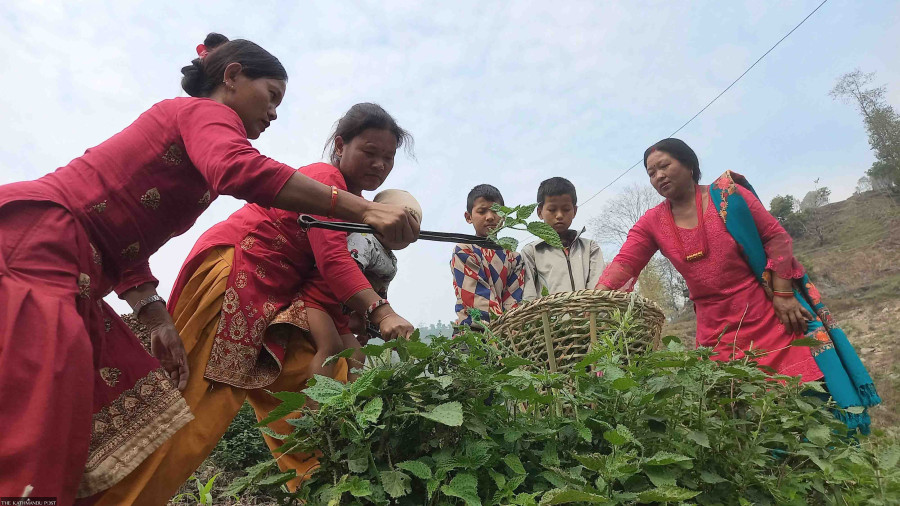Money
Dolakha farmers earn additional money selling nettle leaves
The medicinal value of nettle is driving up the demand in the market, they say.
Kedar Shiwakoti
Nettle leaves, commonly known as Sisnu, which were once left neglected in Dolakha villages, have now become a source of additional income for local farmers.
The locals used to sickle the bushes of nettles, fearing the burning sensation it provided even on accidental touches.
In the earlier days, nettle leaves were occasionally consumed as a vegetable and mostly added to the broth made for livestock for increasing milk productivity.
However, the rising demand for nettle leaves and its powder for consumption as well as medicinal value of late has inspired farmers to start commercial farming.
Nettle is rich in amino acids, protein, flavonoids, and bone-building minerals like iron, calcium, magnesium, potassium, and zinc. Therefore, it is beneficial in the treatment of skin and acne problems.
It is also one of the greatest sources of Vitamin K which helps to maintain healthy bones by promoting osteoblastic (bone production and strengthening) activity.
Nettle has become a staple part of the menu in hotels and restaurants in the cities, as an indigenous delicacy.
“The importance of nettle has increased as people realised its medicinal values,” said Chandra Bahadur Thapa Magar, a 73-year-old local.
Amid the rising market demand, a team of farmers–Thulobari nettle production and processing farmers group–has commenced commercial nettle farming and processing by setting up a factory and plantation on around four hectares of land taken on lease in Melung Rural Municipality-5.
Around 15 other local women also have started collecting nettle leaves from the farmlands and forests in their leisure time to sell to the processing factory.
The locals didn’t believe at first when the factory offered to purchase the nettle leaves as they were used to clearing them away every season.
“Now, we make a reliable income collecting the nettle leaves in our free time,” said Mina Magar, a local.
The women harvest it as per the demand from the factory on an ad-hoc basis and sell it to the factory at the rate of Rs10 to Rs15 per kg.
“We are supplying 20 to 40 kilograms of nettle per day,” added Magar.
The local women make around Rs7,000 a month collecting nettle leaves.
“The factory was set up to utilise the locally available nettle and to generate employment opportunities for the local women,” said Man Bahadur Magar, chairperson of the farmers’ group.
The factory processes 30 kg of nettle leaves to produce around 5 kg of the powder which sells for Rs500 per kg in the market. The factory has a capacity to produce 15 to 20 kg of powder daily.
The local government has also promoted the farming of nettles amid the increasing invasion of monkeys in the farmlands.
“The farmers have been complaining about the woes given by monkeys, unaware of alternative crops,” said Hira Thokar, chairperson of Melung Rural Municipality. “Nettle has a good potential as an alternative crop, especially in the wildlife-prone areas.”




 9.7°C Kathmandu
9.7°C Kathmandu















